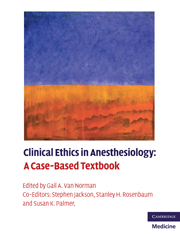Book contents
- Clinical Ethics in Anesthesiology
- Clinical Ethics in Anesthesiology
- Copyright page
- Dedication
- Contents
- Contributors
- Foreword
- Preface
- 1 Consent and refusal
- 2 End-of-life issues
- 3 Pain management
- 4 Research and publication
- 5 Practice issues
- 6 Anesthesiologists, the state, and society
- 43 Physician conscientious objection in anesthesiology practice
- 44 The ethics of expert testimony
- 45 Ethical principles regarding physician response to disasters: pandemics, natural disasters, and terrorism
- 46 Triage in civilian mass casualty situations
- 47 Triage and treatment of wounded during armed conflict
- 4 8 Physician facilitation of torture and coercive interrogation
- 49 Physician participation in executions
- Index
47 - Triage and treatment of wounded during armed conflict
from 6 - Anesthesiologists, the state, and society
Published online by Cambridge University Press: 05 March 2012
- Clinical Ethics in Anesthesiology
- Clinical Ethics in Anesthesiology
- Copyright page
- Dedication
- Contents
- Contributors
- Foreword
- Preface
- 1 Consent and refusal
- 2 End-of-life issues
- 3 Pain management
- 4 Research and publication
- 5 Practice issues
- 6 Anesthesiologists, the state, and society
- 43 Physician conscientious objection in anesthesiology practice
- 44 The ethics of expert testimony
- 45 Ethical principles regarding physician response to disasters: pandemics, natural disasters, and terrorism
- 46 Triage in civilian mass casualty situations
- 47 Triage and treatment of wounded during armed conflict
- 4 8 Physician facilitation of torture and coercive interrogation
- 49 Physician participation in executions
- Index
Summary
- Type
- Chapter
- Information
- Clinical Ethics in AnesthesiologyA Case-Based Textbook, pp. 275 - 279Publisher: Cambridge University PressPrint publication year: 2010



